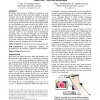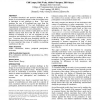109
Voted
CHI
2010
ACM
15 years 8 months ago
2010
ACM
In this paper we portray a specific type of knowledge which we term ‘nomadic knowledge’. It is required periodically by different actors and travels along foreseeable paths be...
CHI
2010
ACM
15 years 8 months ago
2010
ACM
Tablet PCs are gaining popularity but many older adults still struggle with pointing, particularly with two error types: missing, landing and lifting outside the target bounds; an...
63
Voted
CHI
2010
ACM
15 years 8 months ago
2010
ACM
We define occlusion-aware interfaces as interaction techniques which know what area of the display is currently occluded, and use this knowledge to counteract potential problems a...
116
Voted
CHI
2010
ACM
15 years 8 months ago
2010
ACM
HCI research published 10 years ago pointed out that many users cannot cope with the number and complexity of passwords, and resort to insecure workarounds as a consequence. We pr...
113
Voted
CHI
2010
ACM
15 years 8 months ago
2010
ACM
In spite of many advances in GUI workstations, the keyboard has remained limited to text entry and basic command invocation. In this work, we introduce the Touch-Display Keyboard ...
98
Voted
CHI
2010
ACM
15 years 8 months ago
2010
ACM
Both handwriting recognition systems and their users are error prone. Handwriting recognizers make recognition errors, and users may miss those errors when verifying output. As a ...
92
Voted
CHI
2010
ACM
15 years 8 months ago
2010
ACM
Designing for a supple interaction, involving users bodily and emotionally into a ‘dance’ with a system is a challenging task. Any break-ups in interaction become fatal to the...
100
click to vote
CHI
2010
ACM
15 years 8 months ago
2010
ACM
A consistent theoretical and practical challenge in the design of socio-technical systems is that of motivating users to participate in and contribute to them. This study examines...
103
click to vote
MHCI
2004
Springer
15 years 8 months ago
2004
Springer
We describe the implementation of an interaction technique which allows users to store and retrieve information and computational functionality on different parts of their body. W...
115
click to vote
MHCI
2004
Springer
15 years 8 months ago
2004
Springer
Many mobile applications rely on the Global Positioning System (GPS) to provide position and location information. However, there are many problems with using GPS in urban environm...





